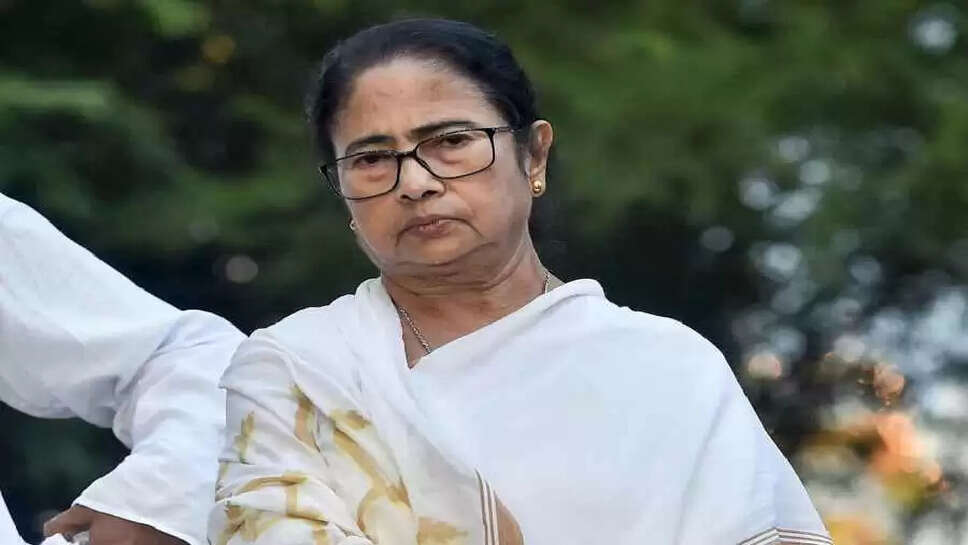Mamata Refuses Action Against Officials, Accuses EC of Bias Towards BJP

West Bengal Chief Minister Mamata Banerjee has once again ignited a fierce political debate by refusing to suspend any government officials over alleged irregularities in the state’s voter registration process. Instead, she turned the spotlight on the Election Commission (EC), branding it a "bonded labourer" of the Bharatiya Janata Party (BJP) and accusing it of acting in a partisan manner.
Banerjee’s fiery remarks come in the wake of the Election Commission’s recent communication to the state government, flagging what it described as "irregularities" and "manipulations" in the ongoing voter list revision. The EC had reportedly recommended disciplinary action against several local-level government functionaries, alleging willful dereliction of duty. However, Banerjee has made it clear that her government will not comply.
“I Will Not Suspend My Officers”: Mamata’s Defiant Stand
Addressing the media at Nabanna, the state secretariat, Mamata Banerjee minced no words in defending her bureaucrats. “I will not suspend my officers at the behest of a politically motivated and compromised Election Commission,” she declared. “They are loyal public servants working under extraordinary pressure. If anyone needs to be questioned, it is the EC, not them.”
She questioned the timing of the Election Commission’s allegations and accused it of selectively targeting West Bengal officials while ignoring similar discrepancies in BJP-ruled states. “Why is the EC silent on fake voters in states like Uttar Pradesh and Madhya Pradesh? Why this sudden concern about Bengal? It is a political script written by the BJP, and the EC is just reading it out.”
The Trigger: Voter Roll ‘Inflation’ and Ghost Entries
The controversy began when the Election Commission flagged multiple entries in the draft electoral rolls in several districts across West Bengal. These included duplicate voters, names of deceased individuals, and allegations of “ghost voters” in highly polarized constituencies.
The Commission sent a list of these anomalies to the state’s Chief Electoral Officer, urging administrative action to ensure the integrity of the electoral rolls. It also recommended departmental inquiries against officials involved in voter data collection and verification processes.
These actions prompted opposition parties, particularly the BJP, to demand the immediate suspension of the accused officials and a deeper probe. In response, Mamata Banerjee alleged that the entire exercise was a ploy to intimidate government workers and create administrative chaos ahead of the 2026 Assembly elections.
“EC Has Become BJP’s Extension Counter”: Mamata’s Sharp Words
Banerjee didn’t hold back in her criticism of the Election Commission’s conduct. “The Election Commission, which is supposed to be an independent constitutional body, has reduced itself to a bonded labourer of the BJP,” she said. “They are no longer neutral. They are now working on orders from Delhi.”
She further questioned the EC’s integrity, pointing out what she described as a pattern of targeting Trinamool-led states. “Every time there is an election, central forces are sent here in droves, officers are changed arbitrarily, and now they want to dictate whom we suspend,” she said.
Banerjee also criticized the BJP for attempting to weaponize the electoral process. “They can’t win Bengal democratically, so they want to tamper with the system,” she said. “They want chaos, they want confusion, and the EC is helping them do it.”
Political Reactions: BJP, Congress Hit Back
The BJP reacted strongly to Banerjee’s comments, calling her defiance an “attack on democratic institutions.” West Bengal BJP president Sukanta Majumdar said, “This is not the first time Mamata Banerjee has shown disdain for constitutional bodies. By refusing to act on EC’s directions, she is protecting corrupt officials who have manipulated the voter list to benefit her party.”
He further demanded the immediate intervention of the central government and the President of India. “If a state CM openly defies the Election Commission, it sets a dangerous precedent,” Majumdar said. “This is contempt of democracy.”
The Congress, meanwhile, took a more cautious tone. Senior state leader Adhir Ranjan Chowdhury said that while the EC must remain impartial, Banerjee’s refusal to take action against officials would only raise suspicions. “Two wrongs don’t make a right. If there are irregularities, they must be fixed through lawful and transparent means,” he said.
Administrative Tensions Rising
The standoff has triggered tension within the state bureaucracy. Several district-level officers reportedly expressed concern about being caught in the crossfire between political parties and constitutional bodies. While the state government has thus far shielded them, some officials fear they may become scapegoats if the conflict escalates.
An officer from the South 24 Parganas district, speaking on condition of anonymity, said: “We are doing our duties as instructed. If there are errors, they should be addressed through the system, not through media trials or political vendettas.”
The West Bengal State Election Commission has so far remained silent on the matter, though insiders suggest it is attempting to mediate between the Chief Minister’s Office and the Election Commission of India to avoid an institutional deadlock.
Opposition Smells Political Strategy
Analysts say Mamata Banerjee’s hardline stance may also be a calculated political move. By framing the voter roll controversy as an “assault on Bengal’s autonomy,” she is positioning herself as a regional leader resisting central overreach — a narrative she has successfully used in past elections.
“She is rallying public opinion around the idea of state rights versus central imposition,” said political analyst Dr. Subir Ghosh. “It plays well with her core voter base and helps her appear as a protector of Bengali identity and federalism.”
Others argue that Banerjee’s refusal to act could backfire if the EC escalates the issue or if legal action follows. “Her defiance might please her supporters today, but administrative non-compliance with EC directions could invite constitutional complications,” said Ghosh.
What Happens Next?
As the Election Commission prepares for a nationwide voter list update ahead of the next general elections, the standoff in Bengal could become a litmus test for how far states can push back against EC directives. The Chief Minister’s statements have effectively drawn a line in the sand, setting the stage for further confrontation if the EC insists on disciplinary action.
In the days ahead, all eyes will be on whether the Election Commission responds with legal or procedural escalation — possibly even recommending central intervention — or chooses to open dialogue with the state government.
A Brewing Crisis of Federal Trust
The row over voter registration in West Bengal is no longer just an administrative issue — it has now ballooned into a full-blown constitutional face-off. At its heart lies a larger question: Can institutions like the Election Commission retain public trust when caught in the crosshairs of political confrontation?
Mamata Banerjee’s resistance reflects deeper anxieties in India's federal structure, where opposition-ruled states increasingly accuse central institutions of bias. Whether this crisis escalates or finds resolution will depend not just on legalities, but on the willingness of all sides to uphold the integrity of India’s democratic processes — beyond political affiliations.
